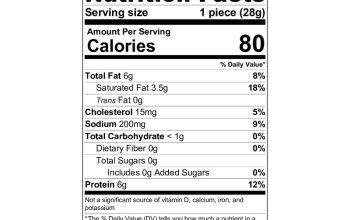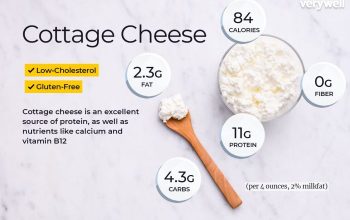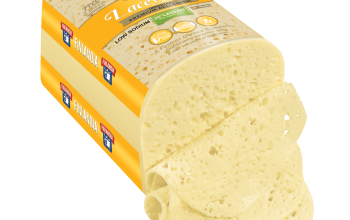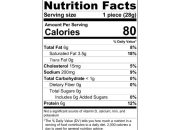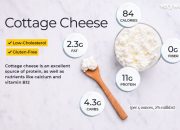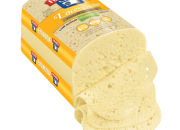Cottage Cheese and Dietary Needs
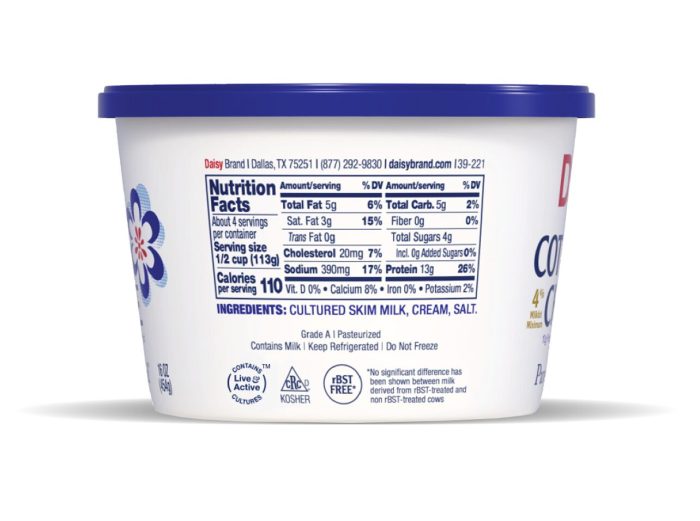
1/2 c cottage cheese nutrition – Half a cup of cottage cheese offers a compelling nutritional profile, making it a versatile food for various dietary goals. Understanding its composition and comparing it to other high-protein options allows for informed choices in meal planning. This section will explore cottage cheese’s role in weight management, muscle building, and bone health, while also addressing potential dietary considerations.
Cottage Cheese Compared to Other High-Protein Foods
The nutritional value of cottage cheese can be effectively assessed by comparing it to other popular high-protein choices. This comparison highlights its strengths and weaknesses in different dietary contexts.
- Cottage Cheese (1/2 cup): Approximately 100-120 calories, 12-15 grams of protein, low in fat (depending on the fat content of the cheese), and a good source of calcium.
- Greek Yogurt (1/2 cup): Generally higher in protein than cottage cheese (15-20 grams), often higher in calories (120-150), and also a good source of calcium and probiotics. Fat content varies.
- Eggs (2 large): Similar protein content to cottage cheese (around 12 grams), higher in calories (around 160), and a good source of choline and other essential nutrients. Contains negligible amounts of calcium.
Cottage Cheese and Dietary Goals
The nutritional makeup of cottage cheese makes it a beneficial addition to various dietary plans.
Weight Management: Cottage cheese’s relatively low calorie count and high protein content contribute to satiety, helping to curb appetite and prevent overeating. The protein promotes muscle growth and maintenance, boosting metabolism. A diet incorporating cottage cheese can support sustainable weight loss or maintenance.
Muscle Building: The high protein content is crucial for muscle repair and growth. Including cottage cheese in a post-workout meal or snack provides the body with essential amino acids needed for muscle protein synthesis. This makes it a valuable addition to a strength training program.
Bone Health: Cottage cheese is a good source of calcium, a key mineral for maintaining strong bones and preventing osteoporosis. Combining calcium intake with regular weight-bearing exercise maximizes its benefits. Adequate calcium intake is especially important for women post-menopause and older adults.
Understanding the nutritional profile of 1/2 cup of cottage cheese, a popular protein source, requires a comparative analysis. For instance, considering the fat and protein content often leads to comparisons with other convenient cheese options like string cheese; a quick check of frigo string cheese nutrition facts highlights the differences in calorie density and macronutrient ratios.
Ultimately, choosing between cottage cheese and string cheese depends on individual dietary needs and preferences, both offering distinct nutritional benefits.
Dietary Restrictions and Considerations
While generally healthy, some individuals need to consider specific aspects of cottage cheese consumption.
Lactose Intolerance: Cottage cheese contains lactose, a milk sugar. Individuals with lactose intolerance may experience digestive discomfort after consuming it. Choosing low-lactose or lactose-free varieties can mitigate this issue. Alternatively, small portions or consuming it with lactase enzyme supplements can help some people tolerate it.
Sodium Content: Some brands of cottage cheese have a relatively high sodium content. Individuals with high blood pressure or those on a low-sodium diet should check nutrition labels and choose low-sodium options to manage their sodium intake effectively. Reading labels and comparing products is crucial for informed choices.
Cottage Cheese in Recipes and Meal Planning: 1/2 C Cottage Cheese Nutrition
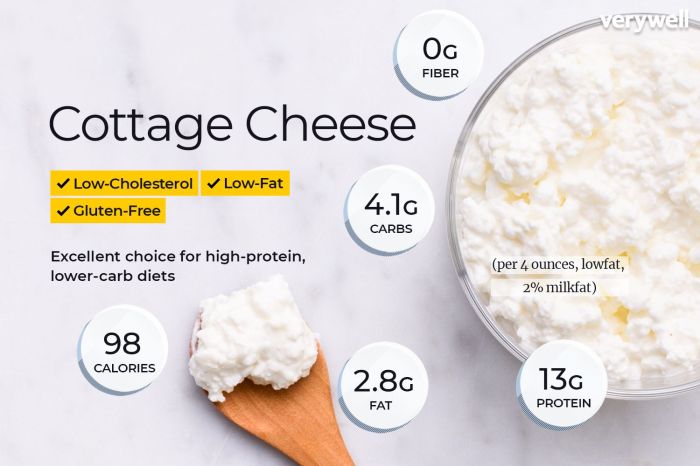
Cottage cheese, a versatile and nutritious dairy product, offers numerous opportunities for incorporation into various recipes and meal plans. Its high protein content, coupled with its creamy texture, makes it a valuable addition to both sweet and savory dishes. This section will explore creative recipe ideas featuring half a cup of cottage cheese, demonstrate its integration into a balanced daily meal plan, and discuss its benefits as a protein source across different meal types.
Cottage Cheese Recipe Examples, 1/2 c cottage cheese nutrition
Including cottage cheese in your diet can significantly boost your protein intake and add creaminess to various dishes. The following recipes showcase its versatility:
- Savory Cottage Cheese Pancakes: Combine 1/2 cup cottage cheese with 1 egg, 1/4 cup flour, and seasonings (onion powder, garlic powder, salt, pepper). Cook like regular pancakes. This recipe provides a protein-rich and satisfying breakfast option, offering sustained energy throughout the morning due to the slow-digesting protein.
- Cottage Cheese and Vegetable Frittata: Whisk together 1/2 cup cottage cheese with 2 eggs, chopped vegetables (onions, peppers, spinach), and cheese. Bake in a preheated oven until set. This recipe offers a balanced meal, rich in protein and various vitamins and minerals from the vegetables. It’s a great option for a healthy lunch or dinner.
- Cottage Cheese and Berry Parfait: Layer 1/2 cup cottage cheese with your favorite berries (strawberries, blueberries, raspberries) and a touch of granola. This simple dessert provides a good source of protein and antioxidants, offering a satisfying and healthier alternative to traditional sugary desserts. The combination of protein and fiber contributes to satiety.
Integrating Cottage Cheese into a Daily Meal Plan
A balanced meal plan incorporating 1/2 cup of cottage cheese can be easily achieved: Breakfast: Savory Cottage Cheese Pancakes with a side of fruit.Lunch: Large salad with grilled chicken or fish, incorporating 1/2 cup cottage cheese as a creamy dressing alternative.Dinner: Cottage cheese and vegetable frittata with a side of whole-grain bread.This example illustrates how easily cottage cheese can be incorporated into a balanced daily intake. The protein content contributes to muscle maintenance and satiety, aiding in weight management and overall health.
Cottage Cheese as a Protein Source in Various Meals
Cottage cheese’s high protein content makes it an ideal addition to various meal types. Its mild flavor and creamy texture allow for seamless integration into both savory and sweet dishes.As a snack, cottage cheese can be paired with fruits, vegetables, or nuts, offering a satisfying and protein-packed option. In desserts, it can replace some of the fat and sugar, creating lighter and healthier versions of traditional recipes.
For instance, it can be used in cheesecakes or muffins, significantly boosting the protein content while reducing the overall calorie count. The sustained release of protein from cottage cheese helps prevent energy crashes and promotes satiety.
Query Resolution
What are the best ways to incorporate cottage cheese into a meal plan?
Cottage cheese can be a versatile addition to breakfast (mixed with fruit), lunch (in salads or sandwiches), or dinner (as a protein source in casseroles). It also makes a great high-protein snack.
Does cottage cheese affect blood pressure?
High sodium content in some cottage cheese brands can negatively impact blood pressure. Opt for low-sodium varieties.
Is cottage cheese suitable for people with lactose intolerance?
Lactose-free cottage cheese options are available, but individuals with severe lactose intolerance should proceed with caution and monitor their reactions.
How does cottage cheese compare to Greek yogurt in terms of nutrition?
Both are high in protein, but Greek yogurt generally has a higher protein density and may contain more calcium. Fat content varies widely depending on the specific product.

